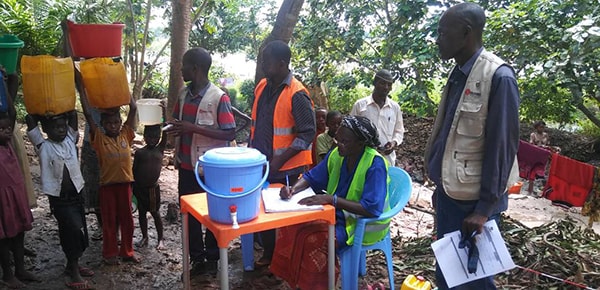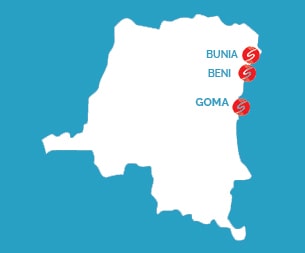99% is the decrease rate in the number of cholera cases in Eastern Kasai and Sankuru provinces in the Democratic Republic of Congo (DRC), to which SOLDARITÉS INTERNATIONAL teams have contributed significantly. Behind the scenes of a success.
Despite a strong recurrence in cases of the ‘dirty hands disease’ in the DRC in 2018, the mortality rate reached 6% in the area of Mbuji-Mayi town, which had not experienced an epidemic since 2004. ‘’This is huge, says Emmanuel Rinck, head of Solidarités International’s operations in the DRC. We are used to mortality rates of 2% in large epidemics.’’
The epidemic had been affecting Sankuru province since June 2018, with equally high mortality rates in some areas, due to their isolation and high population density.

Democratic Republic of Congo (DRC)
Context and action- 107 millions inhabitants
- 179th out of 191 countries on the Human Development Index
- 524.327 people helped
“CLASSIC” ACTIVITIES
While each week sees nearly 300 cases reported, in an area populated by about 2 million people, SOLIDARITÉS INTERNATIONAL teams have carried out ‘’a relatively classic set of activities, says Programme Manager Arthur Maurus. The emergency is being addressed by disinfecting the households concerned, specifically by spraying chlorine in the houses where infected people live, but also by establishing a sanitary cordon of about 40 houses around them.At the same time, we are involved in prevention, with the rehabilitation of water points, the construction of latrines or the awareness of good hygiene practices.’’
These actions were carried out in collaboration with a local health partner in an effort to coordinate national responses to epidemics.
As a result, the most affected communities have benefited from water treatment solutions, the construction of 20 semi-durable latrines, the construction or repair of 10 water points and the distribution of cholera kits, enabling households to fight the epidemic themselves.
Today, the teams are pleased with the number of cases per week, which has dropped from 400 at its peak to 5 today, which is a 99% reduction. Nevertheless, the struggle continues to avoid a resurgence of the disease, which would be inevitable if efforts were to decline.
Contribute to the fight against cholera in DRC
DONATE
These activities are supported by UNICEF, the Canadian Government, the Start Fund and the DRC Humanitarian Fund.
Photo : Thomas Gruel / SOLIDARITÉS INTERNATIONAL

